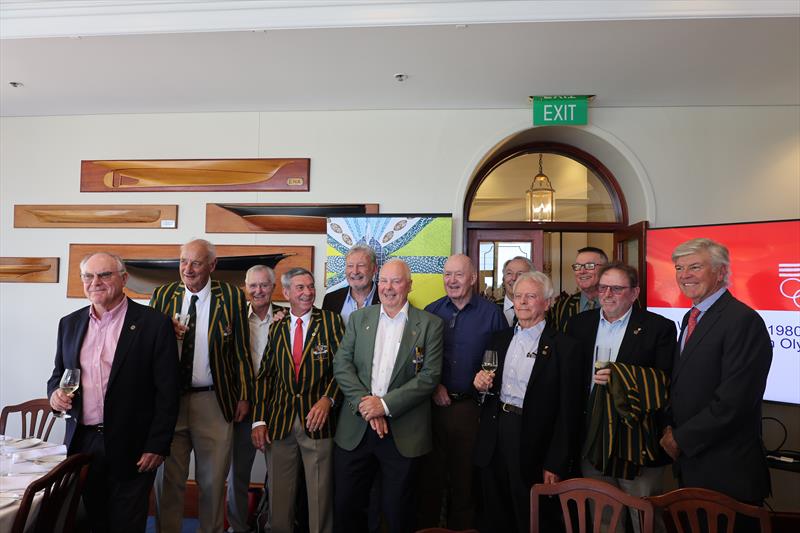
Australia's 1980 Olympic Sailing Team Reunites After 45 Years
by Lisa Darmanin / Australian Sailing Team 1 Oct 14:53 AEST

1980 Australian Olympic Yachting Team © Australian Sailing
It took 45 years, but the athletes who formed Australia's 1980 Olympic sailing team have finally reunited, a gathering marked by reflection, reconciliation, and long-overdue recognition.
Their story is tied to one of the most turbulent moments in Olympic history: in response to the Soviet Union's invasion of Afghanistan, the Australian Government backed calls from the United States to boycott the Moscow Games. While 121 Australian athletes did compete, the sailors never got the chance to race.
Hosted by Australian Sailing CEO and Olympic gold medallist Malcolm Page, alongside representatives from the Australian Olympic Committee (AOC) including President Ian Chesterman, CEO Mark Arbib and Vice President Matt Allen, the lunch brought together sailors who were denied the chance to compete at the Moscow Games due to Australia's boycott.
Nine of the 12 athletes chosen to represent Australia in 1980, along with two reserves, attended the reunion. The Australian Olympic Sailing Team selected for Moscow was as follows:
- 470 - Gary Gietz & Greg Johns
- Finn - Geoff Davidson
- Flying Dutchman - Ian Brown & Glenn Bourke
- Star - Peter O'Donnell & Richard Coxon
- Soling - John Bertrand, Timothy Goodwin-Dorning & Gary Sheard
- Tornado - Brian Lewis & Barry Robson
- Reserves - Mark Bethwaite, Jonathan Holmes & Ian McDiarmid
"It means a lot for them to be here," said Chesterman. "It means a lot for us to have them here. It's part of a process which we hope will see them feeling engaged with our movement going forward."
As part of that recognition, each sailor received an official Australian Olympic team pin. Many proudly arrived in their 1980 blazers, still a perfect fit for some after all these years.
For Page, the event carried personal significance. "Being an Olympian myself, I know how incredible it is to represent your country at the highest sporting event in the world. Now, as CEO of Australian Sailing, I thought it was really important to bring them together and honour them, for the fight, the spirit, and their achievements."
With the LA 2028 Olympics and Brisbane 2032 on the horizon, Page sees the story of the 1980 team as an important lesson for future generations.
"How do we connect with our alumni and share their story? Not only so it's not forgotten, but also to show how fragile high-performance sport can be, and how important it is to take every moment and enjoy it. This reunion is the first step towards that."
For the sailors themselves, the memories remain raw.
"The boycott was devastating because the athletes were paying the price," said Finn sailor Geoff Davidson. "The government was still selling wool, wheat and beef to the Russians. So, it was only the athletes that were paying the price and that was difficult. It was also difficult that some were allowed to go, and our Federation wouldn't allow us."
The disappointment has never truly faded, but the reunion offered a moment of comfort.
"People say, 'How did you get over it?' I never got over it," Davidson admitted. "It's great to be in one room and have our partners here as well, a lot of them went through the pain with us. So, it's a great day."
John Bertrand, who had been set to compete in the Soling, recalled: "I found out initially reading about our boycott as a sailing federation in the newspaper, it was just chaos."
Unlike other sports where individuals could decide to compete, sailors were bound by the decisions of their governing body. The Australian Yachting Federation, along with volleyball, equestrian, hockey and shooting, chose not to send teams, leaving the athletes powerless.
Bertrand also reflected on the sacrifices made by athletes and their families. "In that era, there's no money, no coaching. Rasa, my wife, reminded me yesterday that for the '80 campaign, we took out a second mortgage on our house, the only asset we had, just to keep going."
For Tim Goodwin-Dorning, the boycott reshaped his perspective. "Some of us were lucky enough to keep going. Some of us did other things. There are a few guys here today who this was their one chance, and I really feel for them.
"It certainly gave me a different perspective on competitive life because that was everything at that stage. After that (the boycott), I decided I was going to have another life as well as sailing, and I think that was a bit of balance, but it was a hard lesson."
Despite the lingering hurt, the day carried more joy than regret. There was laughter over shared memories, pride in how far the sport has come, and gratitude that their contribution is now formally recognised.
For the 1980 sailing team, the reunion was about more than nostalgia. It was about finally being seen and finally being acknowledged as part of Australia's Olympic story.